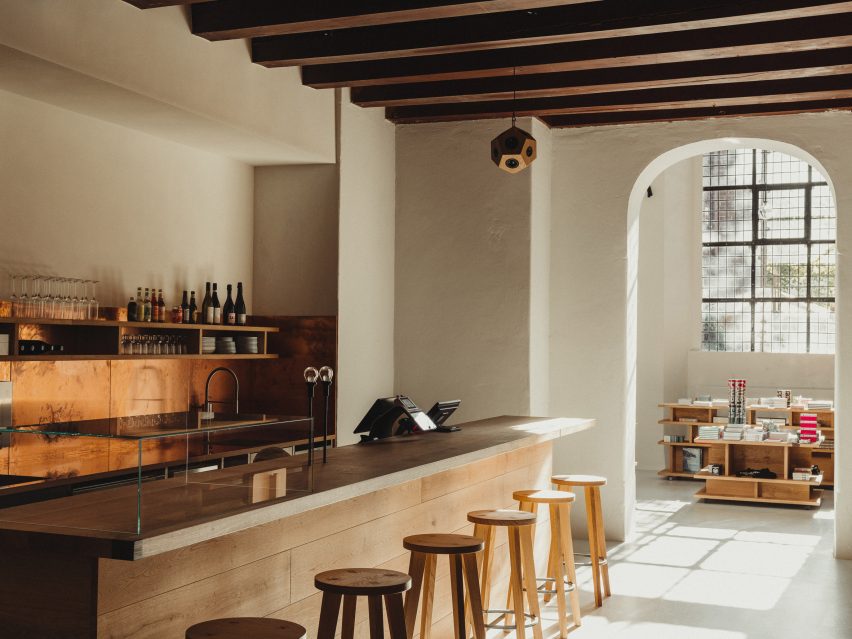MEE Studio creates wood-and-copper interior for Nikolaj Kunsthal cafe
Architecture firm MEE Studio has designed the interiors and bespoke wooden furniture for a cafe and boutique in the Nikolaj Kunsthal art gallery within an old church.
The municipality-run gallery, which is set in a deconsecrated church in central Copenhagen, asked MEE Studio to design a “lively and functional” space.
Before designing the interior spaces, which feature warm and tactile materials such as copper and wood, the rooms in Nikolaj Kunsthal first had to be restored.
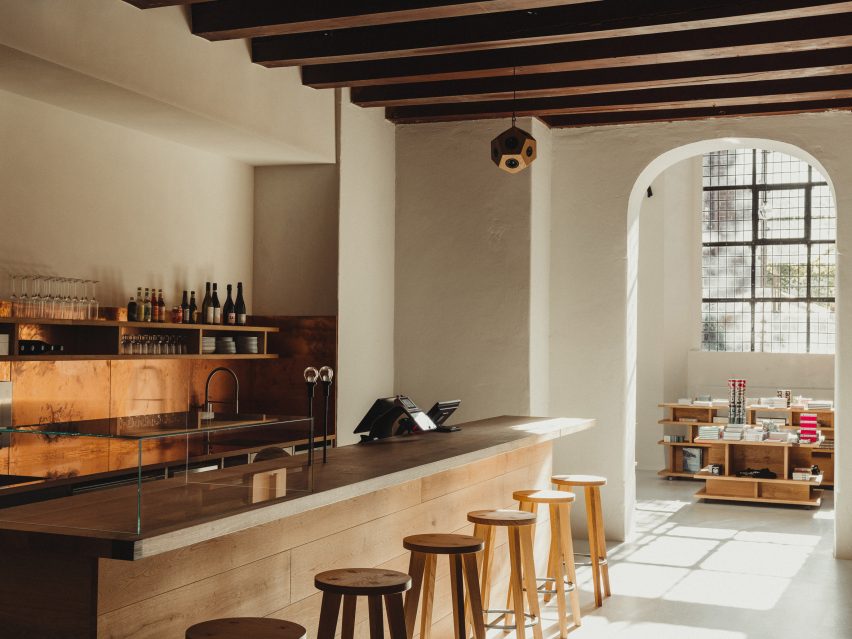
“The spaces had been used for various purposes since the 1980s including art installations and other changing uses,” MEE Studio founder Morten Emil Engel told Dezeen.
“This has left the spaces with remnants of ad-hoc electrical wiring, bricked-up arches, blocked-off windows and arbitrary lighting. Additionally, there was no water supply or plumbing in the spaces that now have the cafe.”
The studio reestablished the grand door and window openings in the space and replaced the old acrylic paint with breathable lime-based paint, while also adding acoustic plaster to improve the acoustics of the spaces.
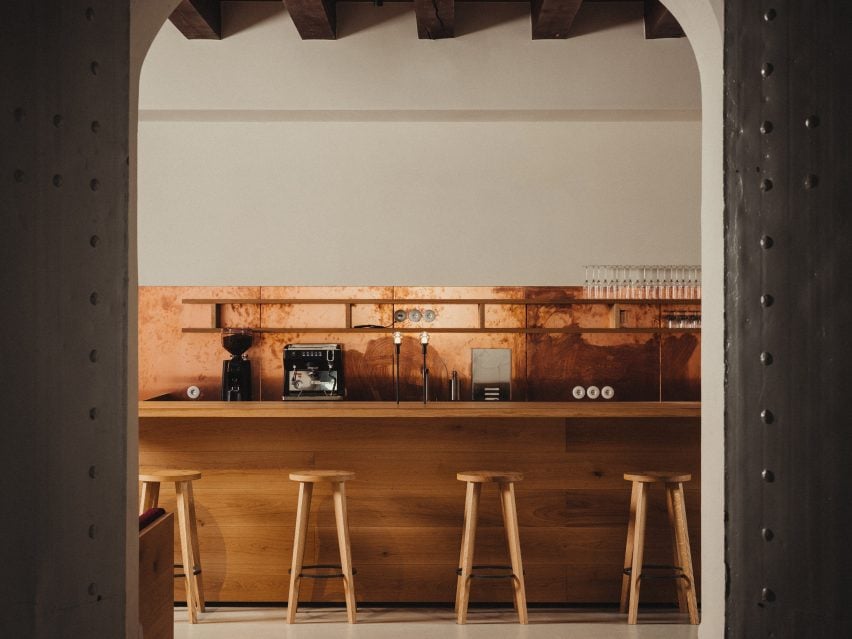
At the centre of the cafe, Engel created a long bar that also functions as a ticket counter and is made from solid oak wood.
Wood was also used for all the other furniture, including benches, tables and sculptural shelves, which Engel designed specifically for the project using European oak from sustainable forestry.
“I wanted the benches to reference church benches – a bit chunky and heavy,” he said. “The church architecture is very robust with the church tower having two-metre thick walls. So the furniture had to have some substance to them.”
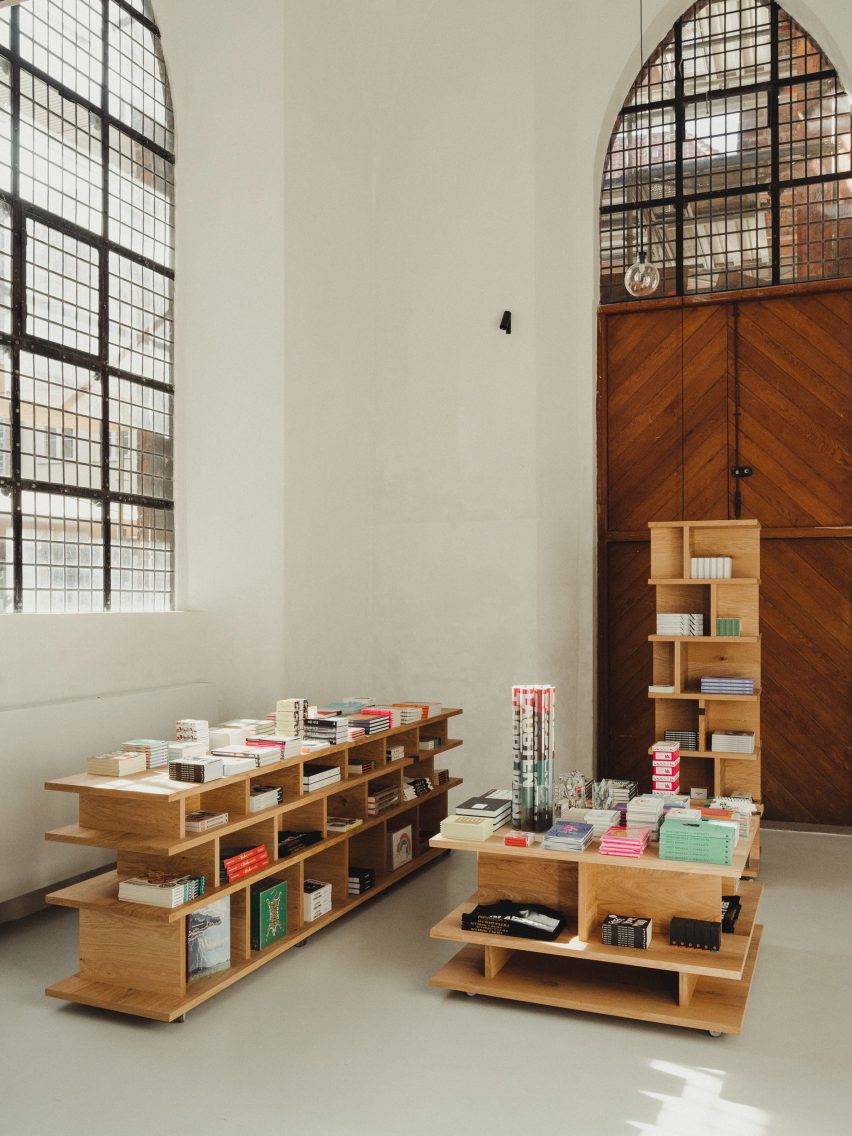
Engel also aimed to give the pieces a contemporary feel by fusing their “heavy look” with more contemporary elements.
“All the furniture has visible joinery and tectonics in fumed oak, which allows the user to see how they are made and assembled,” he said.
“I added some decorative inlays in the bar counter and boutique shelves. Inlays were traditionally used as a way of repairing wood and I wanted to symbolise that repair can be beautiful and sustainable,” he added.
“In this way, it is sending the message that the furniture should have a long life and be repaired if it ages.”
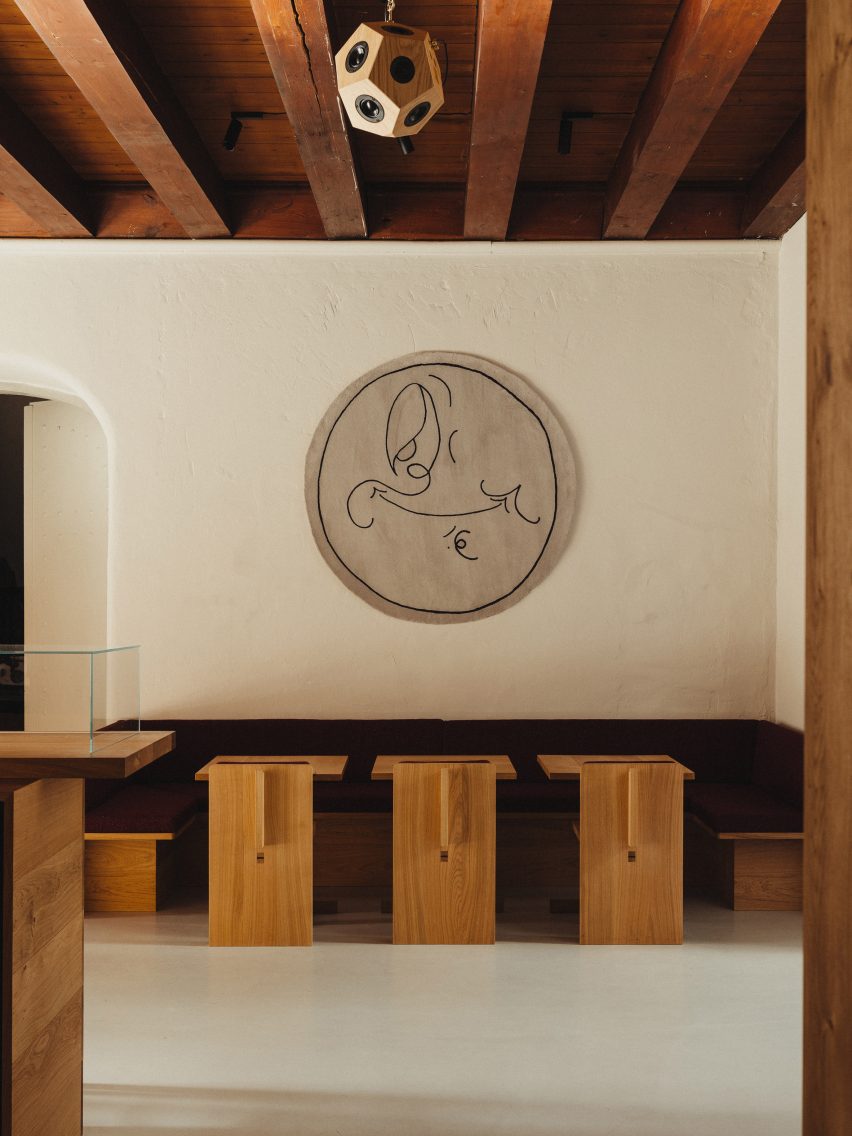
Behind the central bar, a copper backsplash adds an eyecatching material detail together with the matching sink and worktops, which were designed in reference to the roof of the old church.
“As many traditional buildings in Copenhagen, the roof of St Nikolaj Church is made with traditional copper roofing, which has aged to a rich green patina over time,” Engel said.
“I wanted to reference the existing material palate of the church but use it in a new way. So the kitchen features worktops, sinks and backsplash in raw untreated copper, which will evolve beautifully with time.”
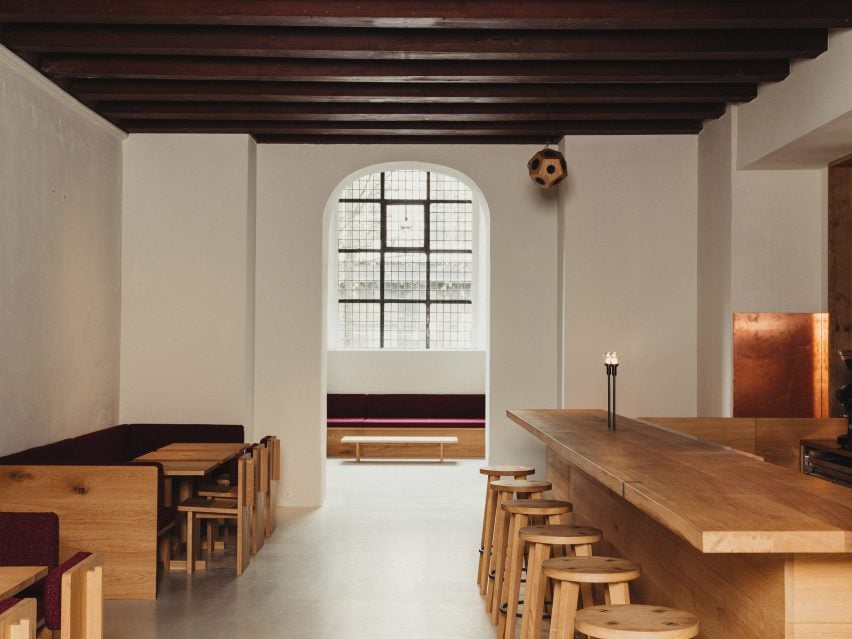
The white walls of the cafe and store were contrasted with not just the copper and wood but also a burgundy red fabric designed by fashion designer Raf Simons for Kvadrat, which was used for the cushions and backs of the sofas and chairs.
The colour was a nod to some of the space’s original colour but could also help disguise red wine spills in the cafe.
“Oakwood was already used throughout the church so it seemed natural to use oak as a material,” Engel explained.
“There was also the burgundy red paint which had been used originally for some woodwork, for instance, the stairs in the tower and the ceiling in what is now the cafe,” he added.
“So it seems natural to work with an interpretation of the burgundy red for the color of the cushions. I matched the burgundy red to a fantastic Kvadrat textile designed by Raf Simons and it worked in providing vibrancy, but also as a practical colour in a cafe where red wine is served.”
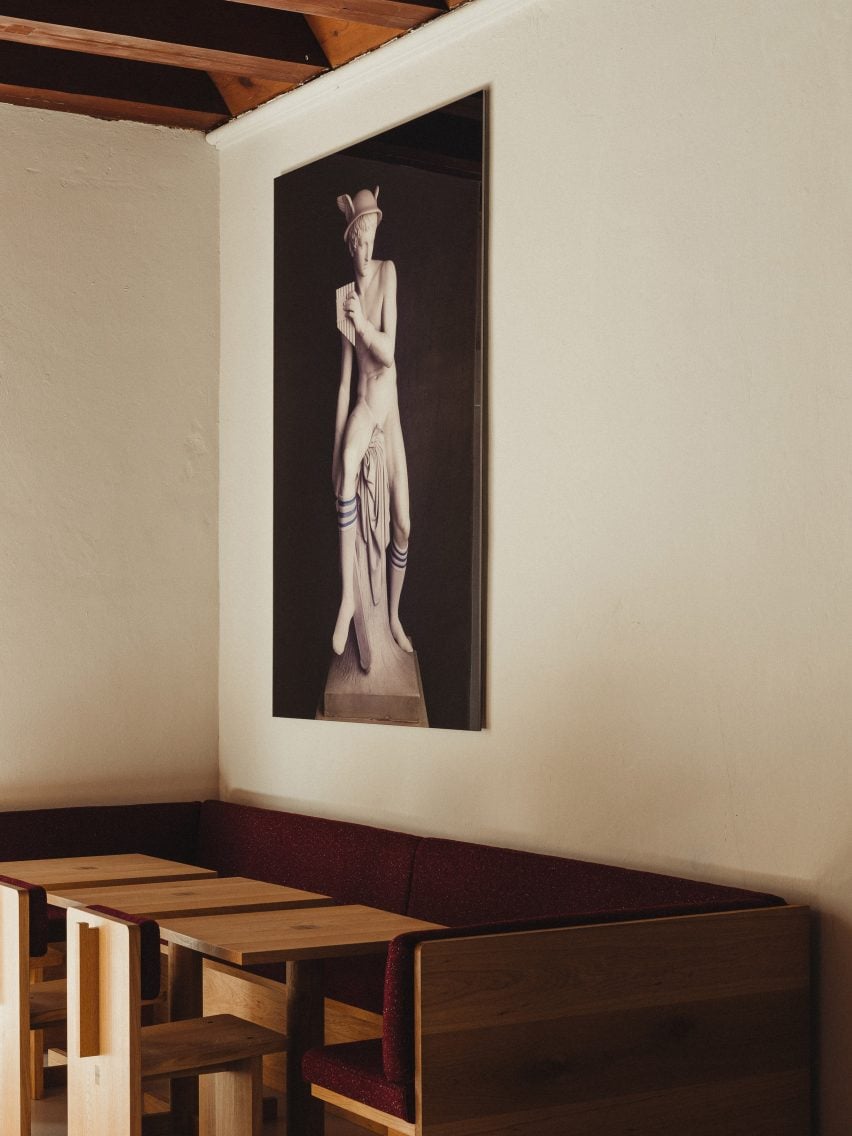
As well as the bespoke furniture pieces, the space was also decorated with carefully chosen artworks that have ties to the city of Copenhagen.
“Mercury (socks) is a photograph by the famous Danish/Norwegian artist duo Elmgreen & Dragset from a series of classical sculptures by the world-famous Danish sculptor Bertel Thorvaldsen,” Engel explained.
“The Thorvaldsen Museum is located only a few minutes away from Nikolaj Kunsthal, so the work relates both to art from the 19th century and contemporary art from the 21st century which is what you find in Nikolaj Kunsthal.”
Other recent interior projects in Copenhagen include Space10’s headquarters, which has a kiosk-like design library, and the cafe and shop design for Designmuseum Denmark by OEO Studio.
The photography is by Paolo Galgani.

